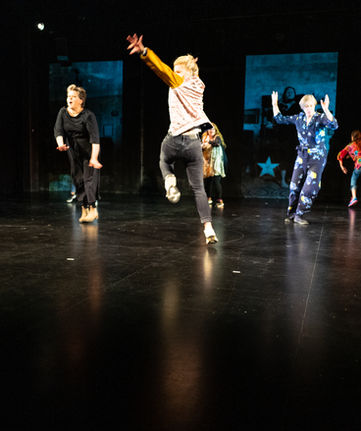
© Owen Fiene
WHEN THE BLEEDING STOPS
When the Bleeding Stops is a performance work by Lovísa Ósk Gunnarsdóttir. In this work Lovísa addresses the silence and taboo that seems to engulf menopause in Western society, as well as her personal experience of aging as a dancer.
After suffering an injury five years ago, Lovísa was forced to reconsider her relationship with dance and the body. This process opened her eyes to the silence around menopause and her own lack of knowledge on the subject. She began researching and posted an open invitation online where she invited menopausal women to participate in her project. Before she knew it, she was working with a large number of women from across Icelandic society.
When the Bleeding Stops invites the audience into a world of vulnerability, shame, empathy and humour. The work transports us into the privacy of the participants homes, and dives deep into the many layers of the female experience associated with menopause and invites us to laugh, cry and celebrate with these women.
The work premiered at Reykjavík Dance Festival in The Reykjavík City Theatre in 2021 and has been touring since. It has gotten excellent critical reviews and the local women participating in the project have described the experience as empowering and even life changing. When the Bleeding Stops was nominated as the most innovative performance of the year at The Icelandic Theatre Awards and Lovísa was chosen as one of 20/23 Aerowaves artists as well as a Crowd artist in 2023. Stay tuned for the coming touring dates here.
Lovísa is now on a mission to travel with the performance internationally, connect to local, menopausal women in each place, gather stories and dance videos from them, introduce them to her artistic practice and invite them to join her on stage. At the same time, Lovísa wants to create a social movement around menopause and take part in changing the narrative on menopause in Western Society.







